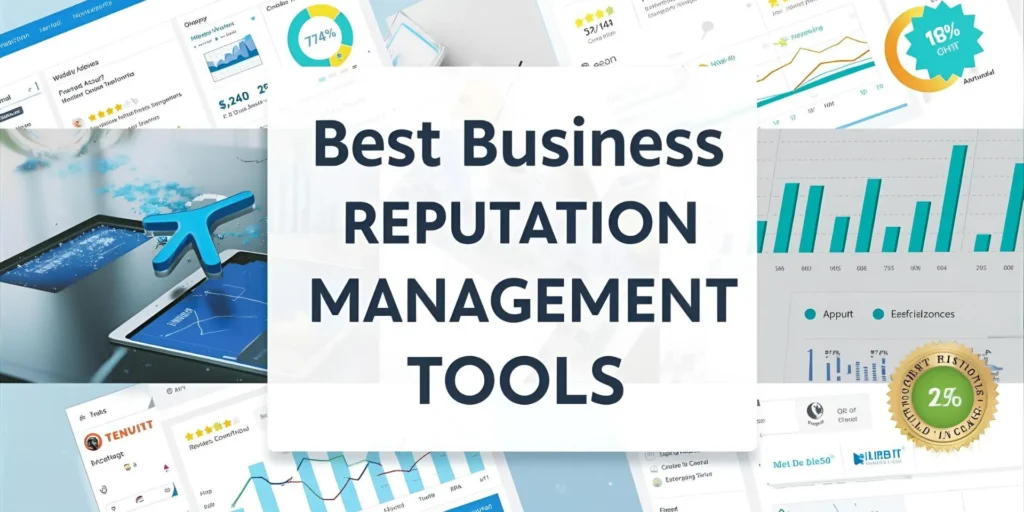In the digital landscape, your brand’s reputation carries its own weight, and mismanaging it can spell disaster. With buyers making purchasing decisions based on online reviews, social media mentions and digital word of mouth, it has become indispensable to manage your brand’s online presence. The right Business Reputation Management Tools allow you to monitor, analyze, and respond to what people are saying about your business across a multitude of platforms.
These powerful solutions enable companies to tackle negative feedback with speed, amplify positive reviews, and maintain a strong online presence that fosters trust and drives growth in an increasingly competitive digital environment.
Importance of Reputation Management Tools for Businesses
- Brand Protection: The Business Reputation Management Tools can aid in protecting your brand from negative publicity, fabricated customer reviews, and content that may have a detrimental effect on your credibility and trust.
- Customer Insight: They offer valuable class analytics and sentiment analysis insights, telling you what your customers think, what they like, and where they struggle, so that you can improve products, services, and more.
- Competitive Advantage: Maintaining a positive online reputation can provide a competitive advantage, as customers are more likely to give positive reviews and rank higher in search results.
- Crisis Prevention: Early detection of negative sentiment enables you to address issues before they escalate into full-blown reputation crises that can result in a negative impact on revenue.
- Income Growth: Reports have shown that businesses with better online reputations gain more customers, convert more, and make higher lifetime value.
- Trust Building: Regularly mitigating customer feedback and taking action on feedback displays transparency and concern, fostering long-term trust relationships.
Key Features to Look for in Reputation Management Tools
- Multi-Platform Monitoring: Keep an eye on all references to your brand on review websites, on social media, in the news, on forums, on search engines.
- Real-Time Alerts: Receive real-time notifications when new reviews, mentions, or comments are posted, allowing you to quickly respond to both positive and negative feedback.
- Response Management: Hub allows the response to reviews and comments from multiple sites from a single dashboard. Messages can be approvable so that teams collaborate and approve messages as required.
- Analytics and Reporting: Develop clear insights regarding overall review sentiment, competitors, review volumes and performance metrics to support decision-making.
- Review Generation: Send automated reviews including requests for happy customers to provide full reviews via email, SMS, or QR codes to increase positive reviews.
- Integration Capabilities: Seamlessly integrate with your CRM, social media platforms, and other business applications to ensure workflow smoothness and organize information.
Comparison Table of Top Reputation Management Tools
| Tool Name | Starting Price | Best For | Key Strength | Platforms Covered |
| Birdeye | Custom Pricing | Multi-location businesses | AI-powered automation | 150+ platforms |
| Meltwater | $15,000+/year | Enterprise | Media intelligence | News & social media |
| Brandwatch | $800/month | Enterprise | Advanced analytics | Social media focus |
| Sprout Social | $199/month | SMBs & Agencies | Social media integration | Social platforms |
| GatherUp | $39.99/month | Small businesses | Affordable pricing | Major review sites |
| Google Alerts | Free | Startups | Cost-effective monitoring | Web-wide mentions |
| Yext | $199/month | Local businesses | Local search optimization | 200+ directories |
| Trustpilot | $299/month | E-commerce | Review authenticity | Global reach |
| BrandYourself | $99/year | Individuals & SMBs | Personal branding | Search results |
| NetReputation | $500+/month | Crisis management | Full-service approach | Comprehensive |
10 Best Business Reputation Management Tools in 2025
1. Birdeye
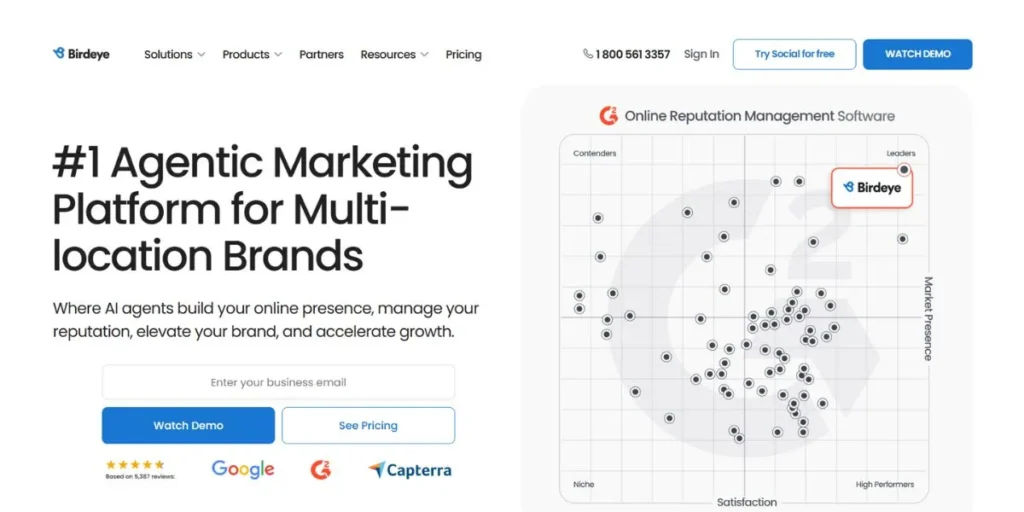
Birdeye is a robust all-in-one platform that is ideal for businesses with multiple locations looking to ensure an easy Business Reputation Management process. Combine AI and intuitive interfaces to automatically pitch reviews, monitor mentions across all channels, and provide you with actionable insights. With all the aforementioned great features, Birdeye makes it possible for you to manage customer interactions from first touch all the way through to post-purchase follow-ups—[sending out a survey, sending a thank you note, updating you on the merchandise, etc.] perfect for patient groups, retail companies, restaurants, and service companies operating in a fast-paced environment.
Key Features
- AI-enabled automated review request and response proposals.
- Multi-location control with centralized management
- Integration with 150+ Review and Social Media platforms
- Competitor benchmarking and advanced Analytics
Pros:
- Automation reduces manual work and is a huge time saver.
- Excellent area wide control, ideal for franchise owners
- Smart AI helps you with customized chats to customers.
Cons:
- Expensive: It can be expensive, which may be a problem for small shops.
- There’s a learning curve before you get to the advanced stuff.
- Pricing is slightly opaque when it comes to budgeting.
Pricing: customizable plans that scale up to the size of your business (typically mid-to-high four figures/year)
Best For: Multi-location businesses, healthcare practices, or any business that needs maximum automation and completely scalable reputation management.
Website: https://birdeye.com/
2. Meltwater
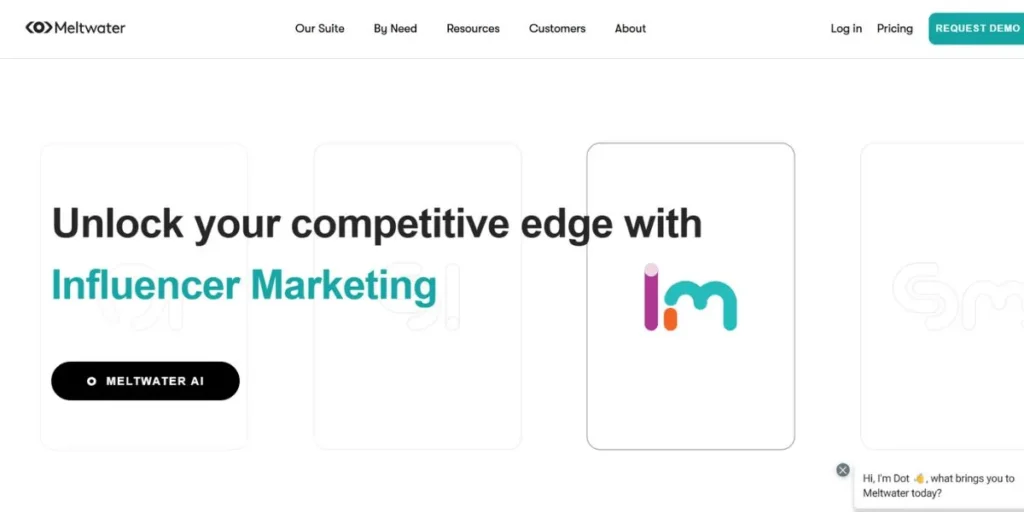
Meltwater offers pure style only text. It is a viable alternative among large corporations that desire to maintain their image and strengthen their Business Reputation Management. The platform monitors online mentions of brands on millions of places (news websites, social media, blogs, forums, etc.) to provide up-to-date information about talks on the brand and in the industry. Meltwater enables businesses, with lean analytical tools, workforce sentiment density, and competitive intelligence, to understand where they are in the market and gauge campaign effectiveness—not to anticipate issues regarding their reputation, but to address them early before they become serious.
Key Features
- Monitoring of international media in 270,000+ news and social sources.
- Advanced sentiment analysis with AI-powered insights and trend detection
- Competitive intelligence and industry benchmarking capabilities
- Customizable dashboards with real‑time alerts and reporting
Pros:
- Extensive global coverage of news sources and social media platforms
- State-of-the-art analytics and enterprise-level reports.
- Strong competitive intelligence and market research features
Cons:
- Premium pricing targets large enterprise budgets exclusively
- A complicated platform that requires a significant amount of time to train and onboard.
- Too complex to serve small businesses with simple monitoring requirements.
Pricing: Annual contracts are between 15,000-20,000+, depending on what is used and its functionality.
Best For: Enterprises, organizations and corporations that need extensive media intelligence and competitive analysis.
Website: https://www.meltwater.com/
3. Brandwatch
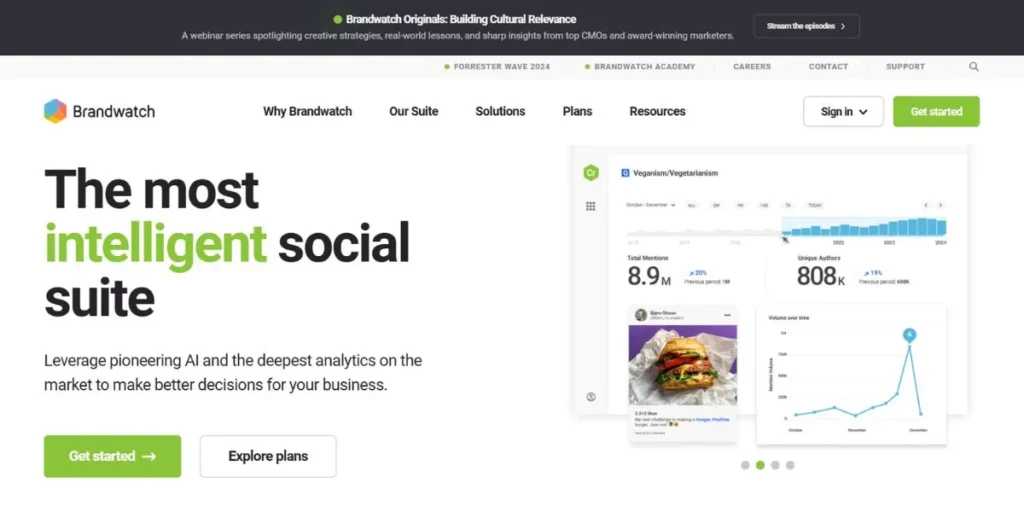
Brandwatch is an enterprise-level social intelligence and reputational analyst that excels in Business Reputation Management. It can process an abundance of social media data, news, and chatter to give you a comprehensive view of your brand. With agile data structures and custom dashboards, Brandwatch supports teams to share insights effectively and to remain at the forefront of real-time analytics to monitor brand mentions. The social listening tool performs better when it comes to complex questions, demographic breakdowns, and rival intelligence, especially for large players who require serious tracking.
Key Features
- Listen in on what is being said online at dozens of locations.
- Totally customizable dashboards with pretty graphical options.
- Discover who’s talking about your brand by age, location, and industry
- Obtain competitor intelligence and benchmark your industry
Pros:
- Great for chewing on data for monitoring at scale.
- Reporting and dashboards which you can customize to your heart’s content.
- Sharp competitive vision and market intelligence
Cons:
- Very expensive – mainly for large companies with big budgets.
- Interface is a puzzle without some training.
- Not very useful for small businesses or on a budget.
Pricing: Approaches $800 monthly but enterprise plans can run into several thousand
Best for: Large enterprises, global brands and ops that require a premier social intelligence and competitor spying capabilities
Website: https://www.brandwatch.com/
4. Sprout Social
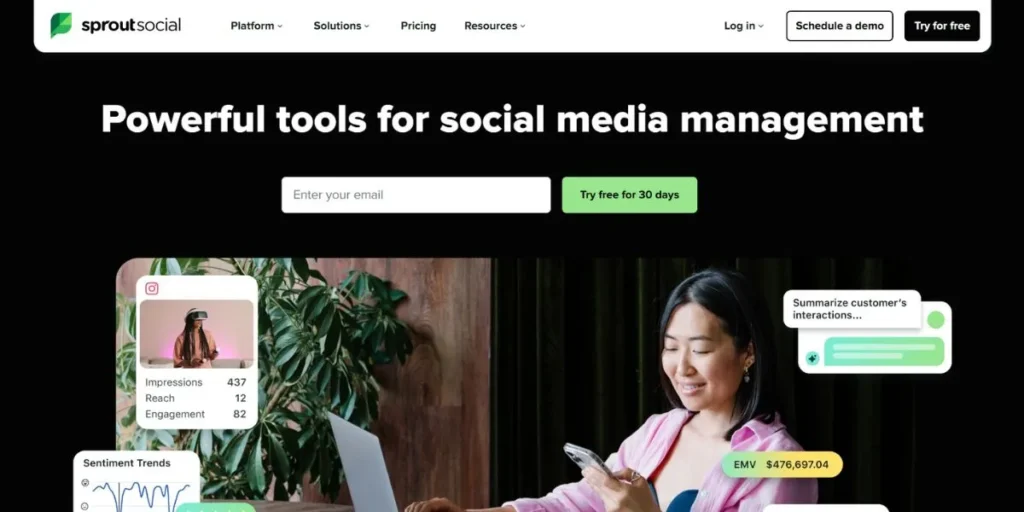
Sprout Social manages more than 30,000 brands. It allows you to get optimal ROI from your social media spend. It handles the publishing of posts, engaging with followers, monitoring results, and collaborating with influencers. Sprout Social blends social media management with reputation monitoring. It’s advisable for companies that want to stay in control of their social accounts and how they’re perceived online .Sprout Social is user-friendly. It includes many social media and clear data reports. Each of these reports is based on how your audience engages with your posts so that you can enhance your social media strategy and safeguard your reputation.
Key Features
- All-in-one dashboard that manages your social and reputation management.
- Engage your people with tools for your team to collaborate
- Total analytics and reporting on your socials performance
- Tools to identify influencers and maintain those relationships.
Pros:
- Combines social media management and reputation monitoring.
- Intuitive and collaborative user interface.
- In-depth analytics to optimize your social performance.
Cons:
- Price is higher than a one-off rep-monitor tool.
- Doesn’t cover social platform reviews
- Actual features can feel a little overwhelming if you only want basic reputation tapping.
Pricing: Begins at $199 per month, 30-day free trial.
Best for: Social media savvy brands, agencies and anyone looking for engagement and rep management.
Website: https://sproutsocial.com/
5. GatherUp
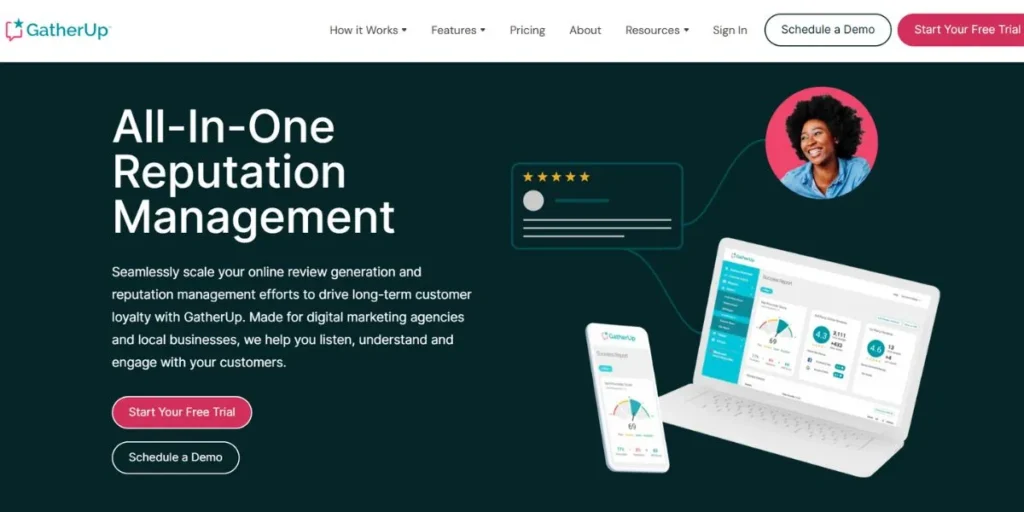
GatherUp is a cost-efficient, user-friendly solution for small and medium businesses that wish to elevate their Business Reputation Management without spending too much. It gets down to the basics, looking at checking reviews, sending automatic review requests, and dealing with replies on major sites. Its clean, no-upsell style gets rid of extraneous frustration while providing the essential tools needed to set up and maintain a favorable online presence. More specifically, it’s great for local stores, small service businesses, and growing businesses.
Key Features
- Request review automatically by email and SMS
- Monitor reviews on multiple platforms and respond directly while on the dashboard
- Administrate surveys to measure customer satisfaction
- Plug into top CRM tools
Pros:
- Good price, ideal for small stores.
- Interface is very easy-to-use – minimal training required
- Works with the software you already use
Cons:
- Not a lot of deep dive analytics compared to more impressive competitors
- Lacking in some of the automation features larger organisations demand
- More limited than full stack solutions.
Pricing: Starts at $39.99 a month
Best for: Small to medium companies, local service business people, and any individual wanting an inexpensive rep manager.
Website: https://www.gatherup.com/
6. Google Alerts
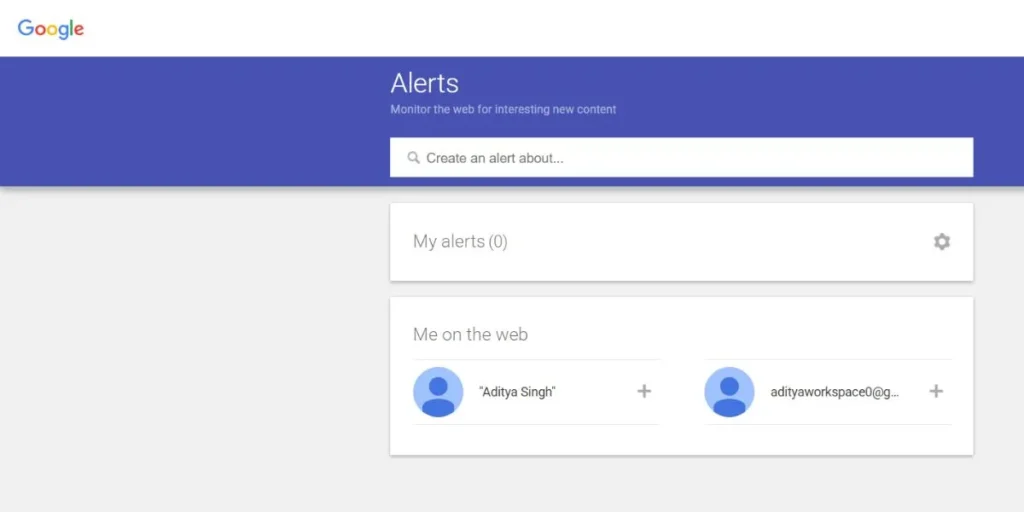
Google Alerts is the simplest place to try reputation monitoring for the first time – it’s a free service that allows you to monitor mentions of your brand across the entire Google web index. It might not be packed with all the bells and whistles of paid services, but it gets the job done for startups, solo founders, and budget-conscious businesses. The best part is that you receive email alerts every time you keyword appears in new content, news stories, or blogs, and so can be in the loop about what’s being said about your brand for a penny of your foot.
Key Features
- Brand name and keyword monitoring from anywhere on the web
- Programmable alert rate and content source
- Easy e-mail notification system
- Support for Gmail and Google Workspace accounts
Pros:
- Totally customizable, so ideal for all sizes of business
- No need for being a tech wizard, it’s easy to set.
- Google’s infrastructure is used for constructing reliable alerts.
Cons:
- Searches only within Google Indexed Content
- No colour-coded text or fancy reports
- No integrated response or engagement tools
Pricing: It’s free – Google’s giving it away.
Best For: Startups, freelancers, small teams that just need very basic brand monitoring and not necessarily pay for reputation management.
Website: https://www.google.com/alerts
7. Yext
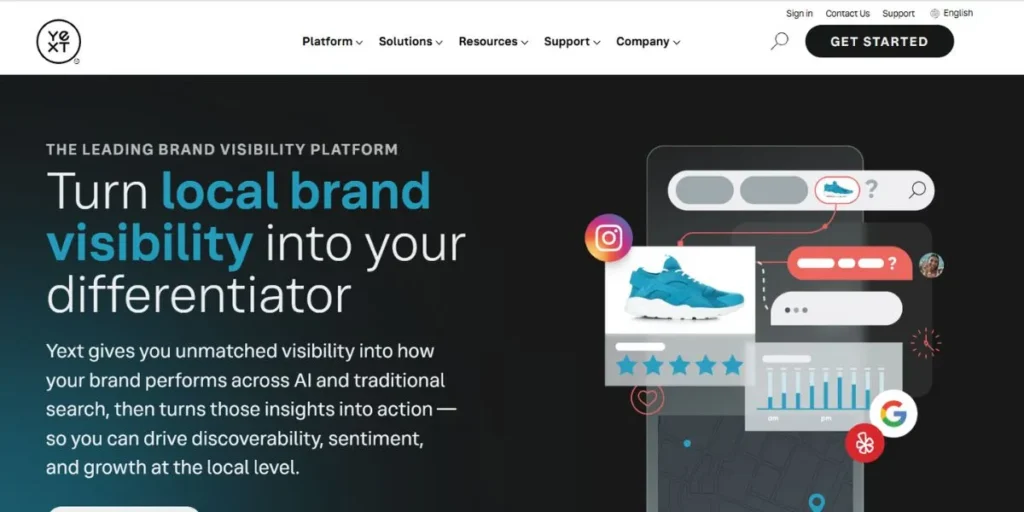
Yext provides real-time review notifications, centralized dashboards for monitoring customer sentiment, and built-in response capabilities that allow brands to engage with feedback directly from the interface. The platform specializes in local search optimization and directory management, making it particularly valuable for businesses with physical locations or local service areas. Yext’s comprehensive approach to local search ensures consistent business information across hundreds of directories while providing Business Reputation Management tools to monitor and respond to customer feedback effectively.
Key Features
- Seo local search in more than 200 directories and platforms
- Centralised response hub and real-time review monitoring
- Control accuracy and consistency business listings
- Local SEO Optimisation Tracking and Analytics
Pros:
- Good local search boost
- Market hundreds of directories to ensure your listings are precise.
- Easy to work with local business ecosystems
Cons:
- Localised search and not reputation-wide control
- Can get expensive for this package deal.
- Social media monitoring does not compare well to specialized tools.
Pricing: Numbers at about $199/mo (with enterprise level plans available).
Best For: Local businesses, multi-location stores, and service providers seeking a higher position in local research and directory examination.
Website: https://www.yext.com/
8. Trustpilot
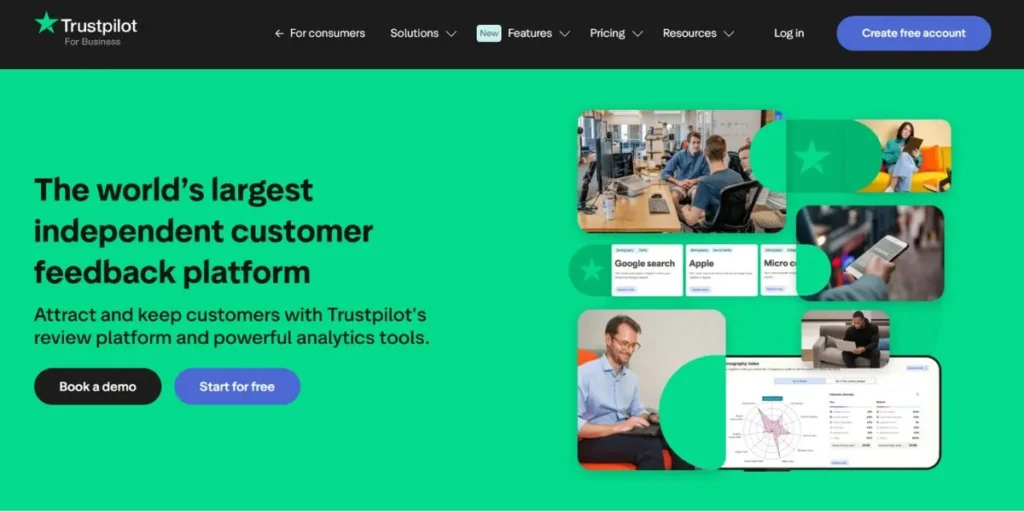
Trustpilot is both a review website and a tool for reputation management, allowing you to collect, manage and display customer reviews via its global network. Because GIF Sticker extends to shows as both a destination for users, as well as a management platform for identifying mentions and impacts, brands not only gain access to a humongous engaged audience, but power through Analytics and reply functionality. The major strength that Trustpilot brings to the table is its dedication to consumer trust and honest reviews for e-commerce stores and any online bookstore or business that sells a product or service.
Key Features
- World-wide review collection and display center
- Advanced competitor benchmarking and review analytics
- Automated review invitation campaigns and follow up chains
- Trust score and badge for marketing buzz
Pros:
- Huge consumer base helps boost your volume of reviews
- High-quality review possibility and counterfeit protection
- Trivially embeddable e-commerce
Cons:
- You can’t decide what displays on Trustpilot, but only how it displays.
- Require a higher tier of plan for premium features
- Primary monitoring is of reviews, not overarching backlink profile
Pricing: Starts at $299/mo – tiered levels based on features and volume
Best For: E-commerce brands, online businesses, and any business that appreciates authentic reviews and wishes to present them in a beautiful manner.
Website: https://www.trustpilot.com/
9. BrandYourself
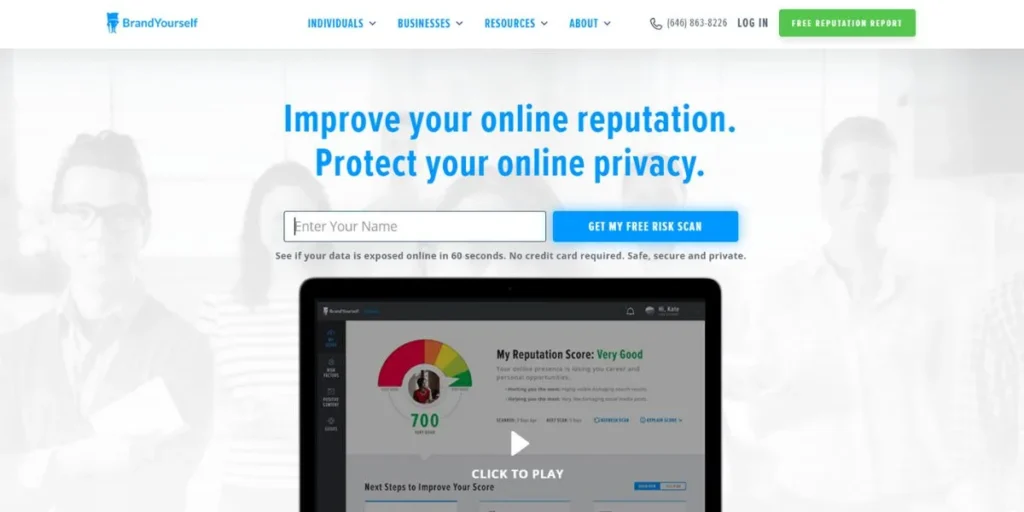
The BrandYourself platform is an all-in-one solution for individuals, professionals, small businesses, and solopreneurs who want to protect and grow their personal or business brand online. It is a unique blend of Business Reputation Management and search engine optimization services designed to assist with personal or business name or brand search outcomes. By maximizing the impact of positive information available and minimizing the effect of negative information, BrandYourself ensures a positive online presence. Given their offer of both self-service software and expert-managed programs, BrandYourself is a great solution for brand protection and enhancement at a personal and small business level.
Key Features
- Web monitoring supported by automation and a reputation scoring system.
- Optimisation of personal profiles across many platforms and directories
- Suppression of negative content through smart SEO tactics
- Anonymity by leaching personal data.
Pros:
- Plans that good people and small businesses can afford.
- High focus on refinement of outcome in search engines and personal branding.
- A combination of self-service and expert assistance to suit various requirements.
Cons:
- Limited number of enterprise features to full business solutions.
- Focuses mainly on search results, not social media monitoring
- Managed services may prove to be expensive to continue using.
Pricing: DIY software begins at $99 / year; managed services range between 399 and 899/month.
Best For: Consumers, professionals, executives and small businesses who would like to shape their online image by the search engine ranking.
Website: https://brandyourself.com/
10. NetReputation
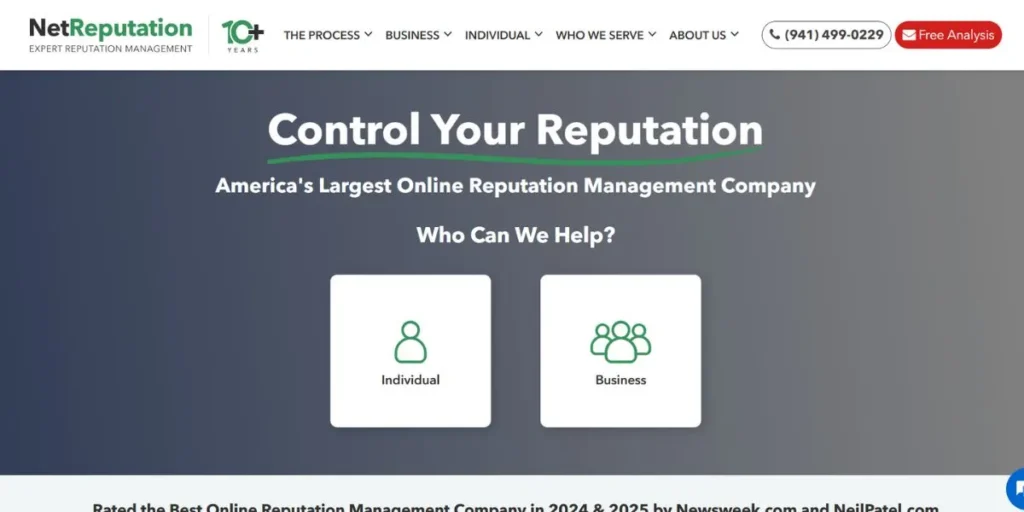
NetReputation is a comprehensive reputation management agency that combines software with human artistry to solve tough reputation challenges. The company is specialized in crisis management, removal of negative content and restoring a positive picture in the online space for companies facing severe reputation crises. Unlike pure software vendors, NetReputation provides hands-on management, empowering people to participate in their own online presence, strategic consulting, and continuous support to get you on the right track.
Key Features
- Total Reputation Management with your own account manager.
- Crisis management plus tools for eradicating nasty content.
- Plug and play review creation and rollback reply system.
- SEO tips to drive up positive chatter.
Pros:
- Expert professional civil service reputation repair skills.
- The right amount of adjuncts and human interaction for a truly solid envelope.
- Experience recovering from PR crises and proven recovery wins
Cons:
- More expensive than DIY software alternatives
- Less control on a daily basis over your reputation
- Fast solutions can take longer for routine fixes because it’s a service.
Pricing: Customised hosting solutions typically cost between $500 and $2,500-$7,000 per month, depending on your requirements.
Best For: Businesses that are in a reputation crisis, executives who need personal brand management or teams that want a pro squad rather than DIY tools.
Website: https://www.netreputation.com/
How to Choose the Right Reputation Management Tool in 2025
- Business Size and Scope: Consider your business’s size, the number of locations you have, and your budget when choosing BRM tools that will scale over time and accommodate your business needs.
- Feature Requirements: Consider what features you truly need, such as review tracking, social media monitoring, auto replies, or crisis management, based on the challenges you face and your capabilities want to gain from your rep.
- Commercial Model: Investigate the business structure, pricing, implementation costs and achievable ROI – consider creating a consistent business stream by increasing reviews, attracting new customers and defending your brand.
- Integration Capabilities: Look for tools with seamless integration capabilities into your existing CRMs, social platforms, and software to maintain smooth operation and efficiency.
- User Experience: Ease of use, training requirements, and aesthetics all contribute to the effectiveness of ensuring everyone from your crew to the entire corporate group can immediately take the platform and actually use it.
- Support and Service: Consider the support, training, and SLAs provided by the vendors to ensure you receive reliable assistance even after you’ve set up and started implementing your BRM tools.
Benefits of Using Reputation Management Tools
- Proactive Issue Detection: Business Reputation Management Tools enable you to identify issues in their early stages and address them before they escalate into major crises that can harm your brand.
- Strengthened Customer Trust: Monitoring and promptly addressing customer comments demonstrates that you care about service quality, instilling trust and making customers loyal.
- Competitive Market Position: Maintaining high online ratings and positive reviews gives you an advantage over competitors who devote less effort to this.
- Operational Efficiency: Because everything is monitored, response templates are used and that everything is managed in one place, you can make reputation work faster, while ensuring all your replies are consistent, and are timely, across platforms.
- Data-Driven Decision Making: Comprehensive analytics and sentiment tracking provide valuable insights into customer preferences, market trends, and areas for improvement, empowering you to refine your strategy and test new heights of innovation.
- Revenue Protection and Growth: Reputation management ensures ongoing income stays safe from poor reviews and attracts new customers due to improved online reputation and online rating.
Conclusion
In the digital reputation landscape of 2025, having the right Business Reputation Management Tools for managing your online reputation requires the implementation of strategies that align with your business objectives and operational needs.You can use full-featured enterprise platforms like Birdeye and Brandwatch, or more affordable ones like GatherUp and Google Alerts. The point is to align the features of the tool with what you need, how much you have and how you want to grow.
Reputation management means you monitor and respond in real-time to the feedback you get and continuously refine your approach based on data.By selecting the right combination of reputation tools and good practices, businesses can establish strong online reputations that attract customer trust, improve market placement, and pave the way for sustained growth. In a developing digital market, reputations are quite directly connected to profits.
FAQs
What are Business Reputation Management Tools, and why do I need one?
Business Reputation Management Tools are software that monitor what people say about you on the internet. They help you identify bad reviews, reply to customers and create a good name and image on review sites, social networks, and other electronic venues.
How much should I spend on reputation management tools in 2025?
Price can be free, such as Google Alerts, or more than $2500 a month for full assistance. Most small businesses can find tools within the price range of $40 to $500 per month, depending on their needs.
Do these tools automatically delete negative reviews?
The truth: Good tools can’t demote bad reviews. They are useful for polite replies for instance, flagging fake reviews so the site can act upon them or writing more positive reviews to push your score higher.
How fast will I see a result from reputation management tools?
Activity can be seen immediately but developing an overall good rating will usually require 3 to 6 months of consistent effort by completing new reviews, responding to questions and resolving issues.
Do I Need Technical Knowledge To Use Billing Reputation Management Tools Effectively?
With easy-to-use screens and most parts accessible at the touch of a finger, some advanced parts may require education. Virtually all vendors provide training and support for the effective use of the software.
